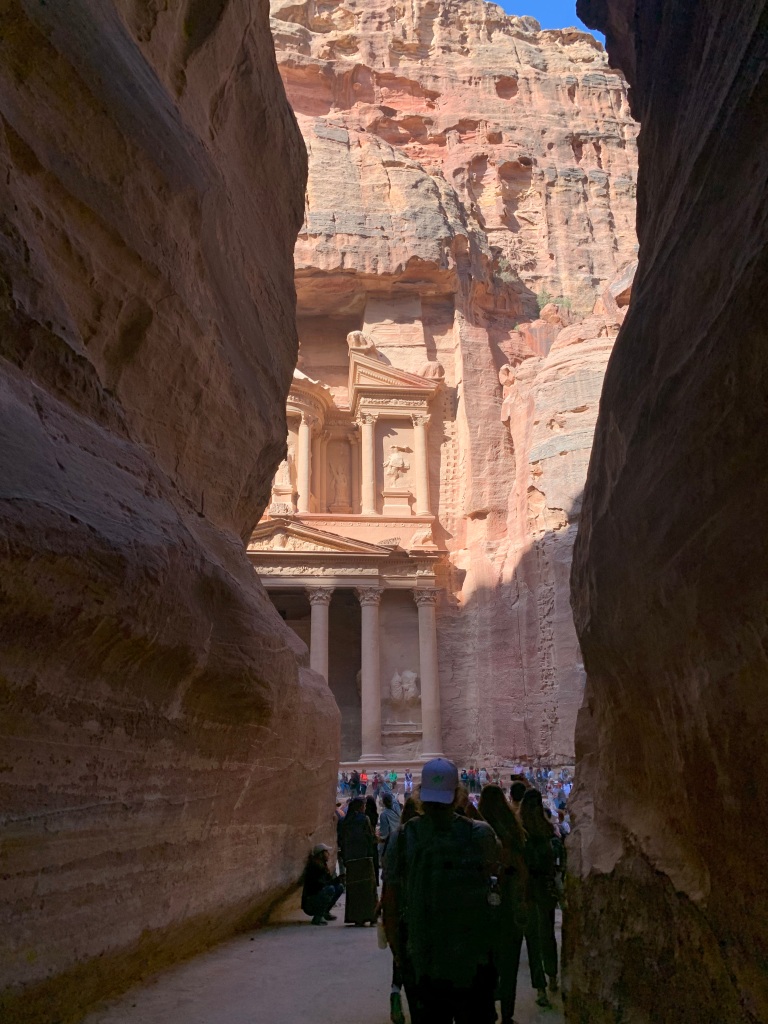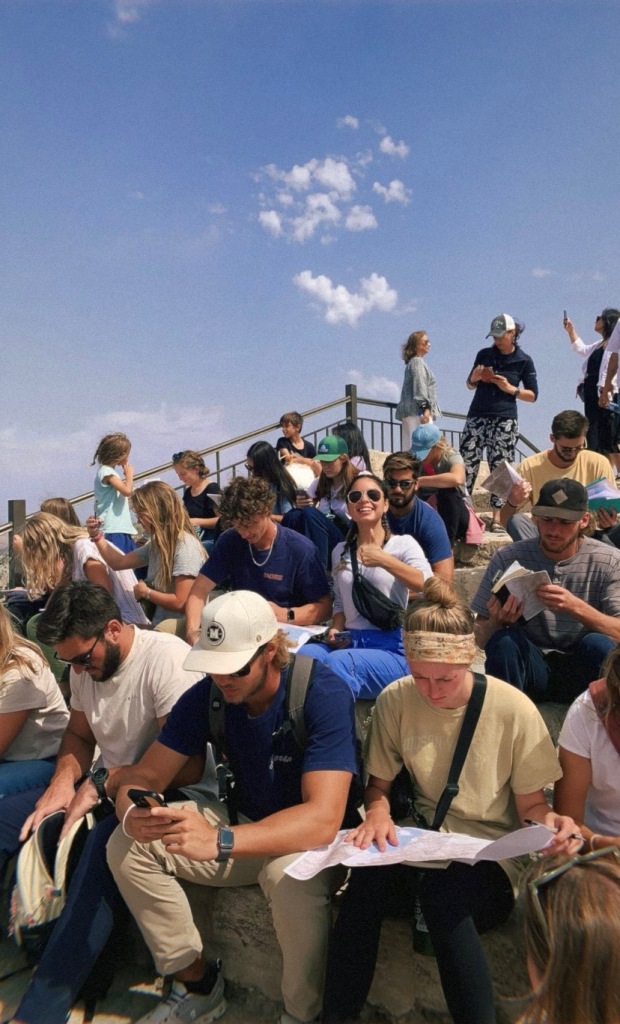Thirty students. Four days. A trek from the Moshav to Master’s that puts the sovereignty of God on full display.
By The Mane Staff
Jordan closes its western border to Israel at 5 p.m. sharp – a minor inconvenience for travelers on a typical day. But Oct. 10, three days after the Hamas attack on western Israel that resulted in the murder of more Jewish civilians on any single day since the Holocaust, was anything but typical.
On that day, 30 students from The Master’s University Israel Bible Extension Program (IBEX) and their professors had been waiting in line for close to five hours, hoping to cross into Jordan and a catch a flight to Dubai and then home to Los Angeles. It was 4:45 p.m. and the border was overwhelmed with hundreds of desperate travelers. Those 15 minutes were everything.
The journey that brought them from the Moshav in southwestern Israel to the border crossing at Beth-shean in Northern Jordan began two days earlier in, ironically, in Jordan.
The group was on a field study trip – four days to explore biblical lands such as Edom, Moab and Petra in Jordan.
“The attacks happened on Saturday, and we were supposed to go back into Israel on Sunday,” said sophomore Sierra Mouser, a biblical studies/Christian education major. “So we just stayed the night in Jordan and decided we would just go to the border and try to cross back into Israel and see if they would let us in.”
Students first heard of the attacks via social media and then got the fuller story from one of their professors on the bus to Petra.
“It didn’t feel real,” said junior liberal studies/teacher education major Esther Ewert. We knew that a lot of Israeli conflicts don’t last long. I didn’t think much of it until we were worried and thinking about the people back in Israel and we were thankful we were in Jordan. The Lord had put us there to protect us not just physically because even if we were in our dorms, we would have been safe, but also emotionally and mentally. We didn’t have to be there when multiple alarms went off in the day.”
When the group arrived back at their campus at the Moshav on Sunday evening, the full weight of what had happened was only just beginning to sink in. Like they rest of the world, they were getting details in bits and pieces. But they had a more intimate perspective.
It was quiet. No one was on the roads,” Mouser said of the Moshav – which is a community of Messianic Jews. “The husbands and the brothers had been called into the army and so they were gone. It was solemn because families had been separated and that was hard to see … your heart hurts for them … to see a husband or a brother walk away.”
The initial plan was to monitor events, but continue with the program. The students were shown the bomb shelter and even held Hebrew class the next day. Class was interrupted by the rocket alarms, but only out of an abundance of caution. The group ate lunch as normal later that day.
“You don’t see anything. You just hear the jets flying overhead – knowing they were going toward Gaza,” Mouser said.
The IBEX campus at the Moshav lies about 10 miles northwest of Jerusalem – more than 40 miles northwest of the northern tip of Gaza, so the fighting was far off. Point of fact, since the war began, the Israeli Defense Force (IDF) has been utilizing the Moshav as a place of refuge for displaced citizens.
In the days immediately following the attacks, however, everything was up in the air. Students and professors in Israel were coping with a rapidly shifting reality. Meanwhile, back home, TMU leadership, in close coordination with IBEX faculty, was considering next steps.
“We had a time of prayer and praise at our professor’s house,” Mouser said. “We knew TMU was trying to decide if we were coming home or not. We prayed for our leaders and also just prayed for Gaza. We prayed and sang together for two hours.
“Honestly, that might be one of the best moments I’ve had in my life. It was scary because we didn’t know what was going to happen in the next couple of days or hours. We just sat there and sang songs. I was blown away by the way God had put amazing, faithful Christians in our group. They were so hopeful and inspired in the way they reacted to these things. I was inspired in my faith just seeing these things.”
Ewert remembers that evening vividly.
“Everybody was going through the same thing and processing it differently,” she said. “I know there was a group of people that prayed that night. The Lord was their stronghold, exactly like the hills surrounding the city of David. The Lord is our protection, and that’s where we can look in those times.”
A second rocket alarm sounded around dinner time on Monday evening. The group was supposed to hold a Bible study at 6 p.m, but heard from their professor that there would be a group meeting in the bomb shelter.
“Our professor told us it looked like other countries were going to join in the war … and that was one of the red lines that couldn’t be crossed,” Mouser said. “…So since it had been crossed, we needed to be sent home. So we packed our bags and by 8 o’clock the next morning we were on our way to Jordan.”
The decision to bring the students home was a pragmatic one. TMU leadership was confident of their safety at the Moshav. However, with much of the country and surrounding regions locked down, there was little reason for students to remain.
“If we weren’t going to be able to travel in Israel … go on field studies and learn the way we were supposed to … we might as well come back to the United States rather than stay on the campus there in lockdown,” Mouser said.
The distance from the Moshav to the Jordanian border at Beth-shean in approximately 90 miles. Packing and getting there was the easy part. Once at the border, things got interesting.
“So many miracles happened between us leaving the Moshav and getting to the airport. God provided so abundantly,” Mouser said.
The first challenge was crossing over.
“The border crossing was packed. We waited in line for a very long time. It took us 4-5 hours to cross the border,” Mouser said. “There was a lot of confusion … [Jordanian border offices] stamping the wrong names, stamping the wrong page on the passport stamped. We had 30 people to get across … it was 4:45 p.m. and we hadn’t gone through customs yet.”
Mouser cannot explain how they managed to get across on time. She can only attribute it to the Lord – and the prayers of His people.
“God was waiting to make us trust in Him more,” she said. “You guys prayed us into Jordan. We got through the border crossing literally right before five. I was nervous that we all weren’t going to get across in time.”
The bus that was supposed to take them to the airport could not make it to the border on time, so the students and faculty were forced to rely on taxis – four or five to a group.
“The people in charge of us were very protective and took care of us the whole time,” Mouser said. We went in groups … at least one guy per group. At least one working phone per group. It was a lot of communication between each of the groups.”
The taxis got the students about halfway there, where they rendezvoused with the bus that would take them the rest of the way. The university had managed the impossible – 30 seats on a plane out of Jordan that night – but whether or not the IBEX group could reach the airport on time was very much in doubt. In fact, it was almost certain they would not.
But they were in Jordan now. They pressed on.
“The bus driver had to go crazy fast to get us [to the airport] there in time,” Mouser joked. “It was like Mario Cart in real life, in Jordan.”
In fact, the group did not get to the gate on time, but the plane was delayed – another one of the miracles Mouser still talks about.
They flew to Dubai that night and then flew a second, 16-hour leg to Los Angeles International Airport. In what might be described as exceedingly fortuitous, the 2023 IBEX students arrived back on the TMU campus on Wednesday around 6 p.m.
Mouser knows luck had nothing to do with it.
“I had so many people saying they were praying for us,” she said of the exodus from Israel. “The Body is so alive in those moments. It was truly amazing.”
Members of the group were relieved to be home, but the transition has not been an easy one. They still have a lot to process.
“It was sad because I loved Israel so much while we were there,” Ewert said. “…We were expecting to be there until December. However, all of us knew that that was what was best for us … we were there for academics, and how can we steward that best in the situation? It’s a hard pill to swallow because I just wanted to be there, and I still want to be there, but it just didn’t make sense.”
Mouser noted the disparity between what she and her fellow IBEXers experienced and how it is experienced from afar. “It felt like this part of the world was untouched by the war we had just come from. That was hard,” she said.
This is the third time in the decades-long history of IBEX that a group has come home early. The first was in 2001, following the attacks of Sept. 11. The second was in 2020 because of COVID.
Whether or not TMU will send a group in the spring semester depends on the status of the war in Gaza, and more specifically, the availability of the Moshav.
Meanwhile, the 2023 students are either completing their IBEX course work via live Zoom meetings, or have opted to cancel their IBEX courses and replace them with other online offerings through TMU online.
Mouser hopes – even plans – to return.
“I hope and pray that Israel can’t get rid of me that easily and that I get the chance to go back,” she said. “I know I’ll be back, whether in this life or the next.”






